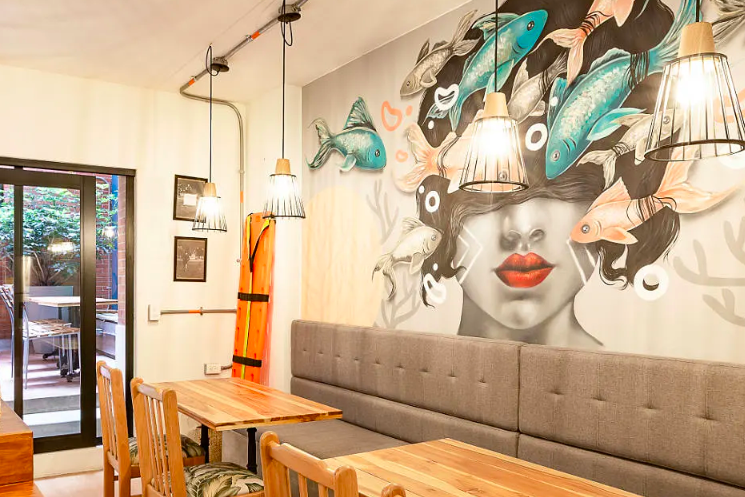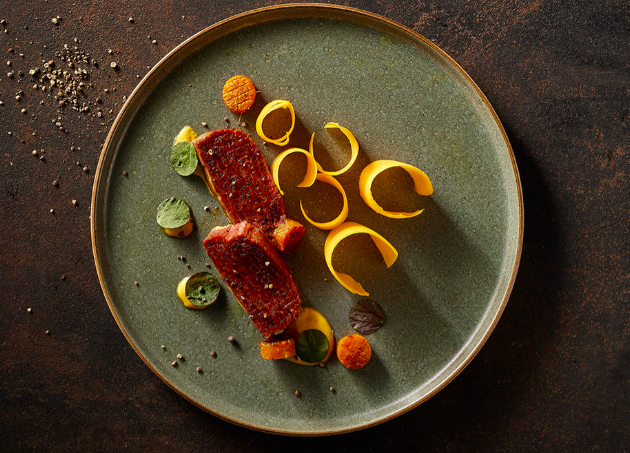
A dining area at Selina's Chapinero location in Bogotá, Colombia
If you haven’t yet stayed at a Selina property, that global wanderer within you has been suffering some serious FOMO. Think of a boutique hotel, plus a hostel, plus a bougie co-working space, and you’ve got Selina. Founded less than a decade ago, most of the company’s properties are in Latin America, but this chain popular with millennial and Gen Z digital nomads is also opening more locations across the U.S., Europe, Israel and Australia.
The chain known for its continuous accommodation programs, onsite yoga classes for guests, programs to promote local artists and interiors full of endless pops of color is now taking another step to redefine what hospitality means: All menu items at Selina will now have plant-based alternatives.
Why would a hotel chain go plant-based?
Let’s take a quick look at the various ways in which we can all reduce our carbon footprint. Consumer goods companies want you to believe that opting for the cold-water cycle on your washing machines or using a dishwasher over handwashing dishes will save the planet. Elon Musk and his fans will tell you electric vehicles are the way to drive a low-carbon future. And Greta Thunberg and her allies will tell you air travel has got to stop if we’re going to curb emissions.
There’s a degree of truth in all of the above assertions. But those same detergent manufacturers often stumble when it comes to explaining why we should buy products that are 90 percent water and come in plastic that isn’t recyclable. Dish care makers tout their detergent pods without thinking about equity — if one’s home isn’t equipped with a dishwasher or a family can’t afford one, this common trope of putting the onus on consumers to save the planet won’t move the sustainability needle at all. The equity argument carries over to electric cars: Many middle-class folks can’t afford the upfront costs of such a vehicle, not to mention the fact that the batteries powering EVs carry their own human rights and environmental problems. Yes, air travel generates impact, but let’s not get carried away in pointing fingers at the occasional traveler: Private air travel, such as the 17-minute flights taken by the likes of Kylie Jenner, is an indulgence that is far more polluting.
Editor's note: Be sure to subscribe to our Brands Taking Stands newsletter, which comes out every Wednesday.
But if people would reduce their meat consumption, the benefits for the planet would scale far more rapidly. Further, changing one’s eating habits is a relatively simple act; going meatless doesn’t entail creating another problem, whether it’s plastic from buying an alternative cleaning product or waste from trading in a gas-powered vehicle.
Research on how reducing meat consumption can heal the planet are all over the map. One study from 2019, for example, suggests that if Americans alone would reduce their meat intake by a quarter, annual global greenhouse gas emissions would drop by 1 percent. Additional research concludes that if animal agriculture were phased out over the next 15 years, that would nix almost 70 percent of the world’s carbon emissions through the end of this century. Another study suggests the global meat supply chain ranks equally with worldwide transport when it comes to the generation of emissions.
Selina rolls out a plant-based menu
Selina is starting this plant-based rollout with a soft launch. The company already boasts a fully plant-based restaurant at a London location, and a Tel Aviv property will introduce plant-based options at its restaurant later this month.

Redefine Meat, which makes plant-based alternatives to menu items such as a flank cut, sausages and even a kebab mix, is Selina’s partner on this initiative. Sustainability is part of what explains this shift: Redefine Meat’s claims that its products require 96 percent less water and 98 percent less land while emitting 91 percent fewer greenhouse gases contribute to what makes for a seamless decision by Selina.
But appealing to millennials and Gen Z, who currently comprise the bulk of digital nomads, is also driving Selina’s strategy. Though sustainability is an important part of these consumers’ decision to go increasingly plant-based, so too are factors such as animal welfare as well as concern over one’s health and wellness.
Should Selina follow through on this plan, it’s much bolder than what most hotel chains offer on the sustainability front — whether they are asking guests to hang their towels if they don’t want them washed, or nebulous promises to go net-zero by mid-century.
Image credit: Selina

Leon Kaye has written for 3p since 2010 and become executive editor in 2018. His previous work includes writing for the Guardian as well as other online and print publications. In addition, he's worked in sales executive roles within technology and financial research companies, as well as for a public relations firm, for which he consulted with one of the globe’s leading sustainability initiatives. Currently living in Central California, he’s traveled to 70-plus countries and has lived and worked in South Korea, the United Arab Emirates and Uruguay.
Leon’s an alum of Fresno State, the University of Maryland, Baltimore County and the University of Southern California's Marshall Business School. He enjoys traveling abroad as well as exploring California’s Central Coast and the Sierra Nevadas.














